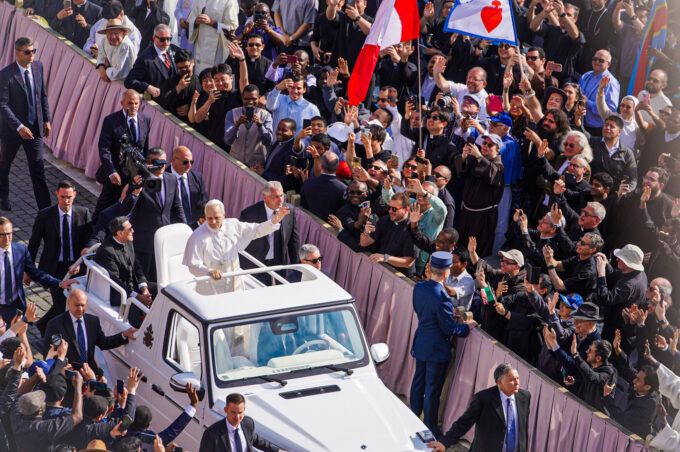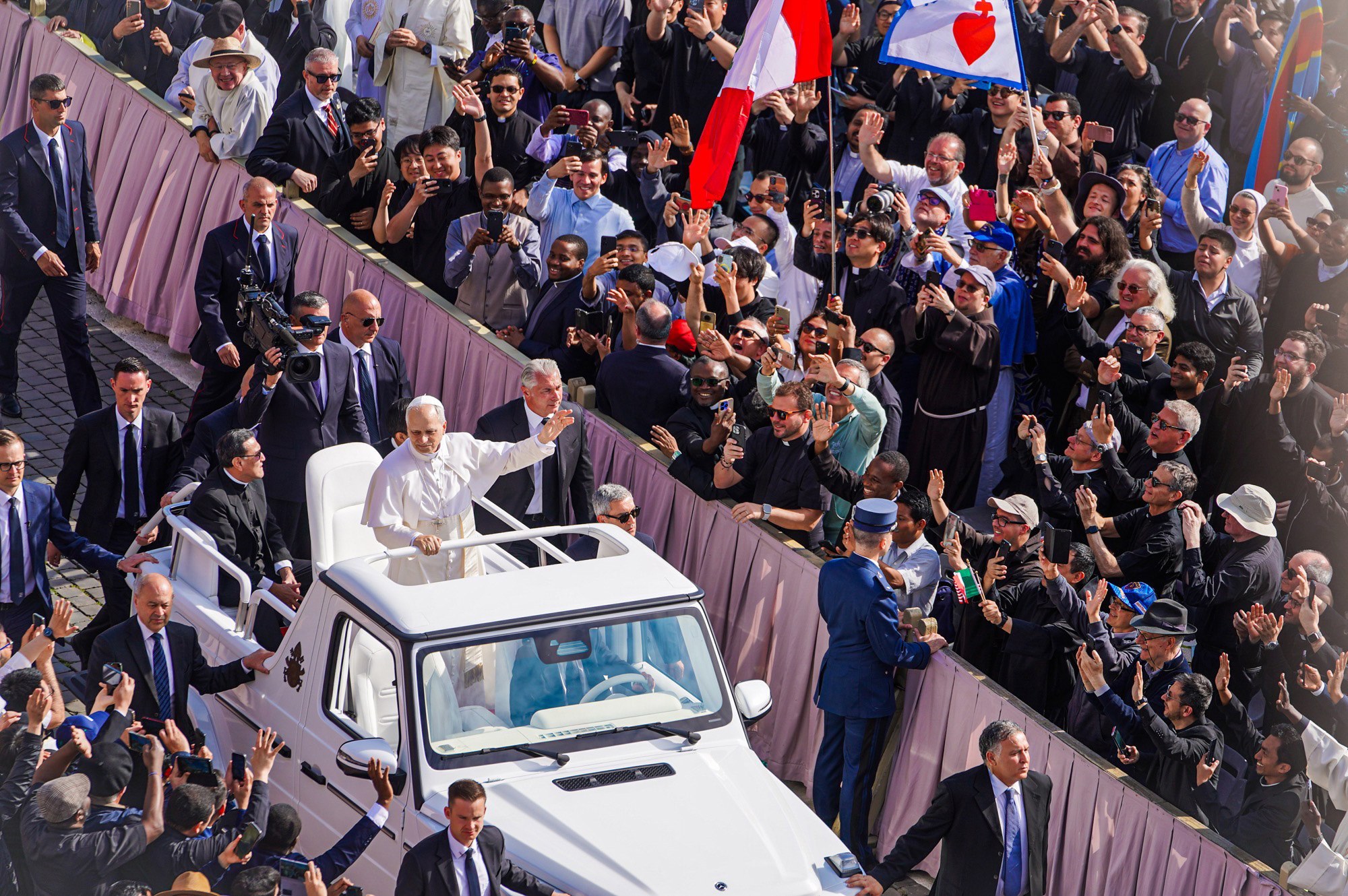






























































Photograph Source: U.S. Department of State – Public Domain
The world of Donald Trump, Elon Musk and similar believers in transactional reality has created a moral vacuum. There is an urgent need to find some moral authority to re-establish a balance. To that end, what can the new Pope do? What moral power can the new Pope use when “popes now have no more than a marginal influence on the opinions and behavior of the faithful,” Fintan O’Toole observed in The New York Review of Books.
The election of Robert Francis Prevost as Pope Leo XIV was a global event. There was worldwide media attention as the 133 cardinals’ deliberated. Hundreds of millions waited for the puffs of white smoke. Given the widespread fascination with the Pope’s selection and inauguration, can the new Pope be a source of global moral authority beyond just being the leader of 1.4 billion Catholics and the Catholic Church? As an American, for example, will he stand up against Trump’s dehumanizing immigrants, attacks on multilateralism, and denial of the climate crisis?
What is the Pope’s power to act? Josef Stalin is reputed to have asked, “Have many divisions does the Pope have? For Stalin, power was based on military strength. The Papal Swiss Guard – the 135 Swiss military elite who make up “the world’s smallest army” – certainly don’t count as a serious military force.
But Pope Leo XIV raised other possibilities of power in his initial public address; the power of the Church to be positively involved in geopolitical realities and the possibility for him to be a force for peace.
This is how the Pontiff began his first public speech: “Peace be with you – Dearest brothers and sisters, this is the first greeting of the Risen Christ, the good shepherd who gave his life for God’s flock. I too would like this greeting of peace to enter your heart, to reach your families, to all people, wherever they are, to every nation, [to all peoples] to the whole earth. Peace be with you!”
Leo XIV began and ended with “Peace be with you.” (Whether the translation from Italian to English was “to every nation” or “to all peoples” is not crucial.) For the new Pope, in his initial pronouncement, peace – personal, social, geopolitical, and global – was his first priority.
One noteworthy avenue of peace arose when at about the same time Habemus Papam was pronounced, Western leaders identified the Vatican as the ideal place for negotiations between Moscow and Kyiv over the Ukraine-Russia conflict. “I was asked to verify the availability to host the negotiations,” Italian Prime Minister Giorgia Meloni revealed. The Church’s role of diplomatic host “is firmly situated in the great tradition of the diplomacy of the Holy See, which has always tried, when a conflict erupts, to propose its mediation” a church historian was quoted in Le Temps.
The roles of the Church as a spiritual institution or the role of the Vatican as the geopolitical Holy See are not rigidly delineated. The line between a pastoral role and a diplomatic one is fluid. Historically, the political intervention of the Church has precedents. Several Popes were active in mediating between the United States and Cuba; three Popes visited Cuba as part of those efforts and Barack Obama paid tribute to Pope Francis’s help in normalizing relations between the two countries in a nationally televised address: “In particular,” Obama said, “I want to thank His Holiness Pope Francis, whose moral example shows us the importance of pursuing the world as it should be, rather than simply settling for the world as it is.”
Is the power of the Pope an individual power based on his personal moral authority? Or is it in his role as the head of the Church or as the diplomatic head of the Holy See?
There are obvious negatives with the Pope and/or Church becoming politically/diplomatically active. The American Protestant theologian Reinhold Niebuhr’s Moral Man and Immoral Societydistinguished between individual morality and the morality or immorality of society. The and in the title says it all. Individuals alone and individuals in groups, Niebuhr postulated, have different rules of behavior. It has been said that certain devout political leaders have no problem praying in church on Sunday and ordering immoral bombings on Monday.
Will Pope Leo XIV become an exceptional leader with moral authority beyond just being the head of the Catholic Church and the diplomatic head of the Holy See? If so, where will that moral authority come from? Cardinal Prevost’s election showed that he ticked many boxes: the first Pope born in North America; multilingual; missionary in Latin America; head of the St. Augustine Order; familiarity with the Vatican’s bureaucracy. Global and local at the same time, with Afro-Creole, French, Italian, and Spanish heritage.
But there are no specific boxes to tick for individual moral authority. What boxes did Nelson Mandela, Martin Luther King Jr. and Mahatma Ghandi tick to attain their global moral authority? Certainly not the same boxes. There is no magic formula.
More importantly, is there a need today for a moral authority? A need for a recalibrated global moral compass? There is much attention to a constitutional crisis in the U.S. and the ineffectiveness of the International Court of Justice and the International Criminal Court. But morality and law are not the same. Issues of the constitutionality of many of Trump’s actions as well as the larger questions of the role of international law are legalistic challenges. And rightly so. But they do not directly involve moral or ethical standards. Legal questions are usually settled in courts; moral and ethical questions are settled elsewhere, if at all.
What is beyond the legal questions that cannot be settled in courts? The law, in Lon Fuller’s wonderful phrase, has “an unfolding purpose.” What that purpose is defies simple definition. Harvard students flock to Professor Michael Sandel’s course on “Justice” because Sandel raises questions the other professors deal with only indirectly, at best. Sandel’s is the first Harvard course to be made freely available online and on television; it has been viewed by tens of millions of people around the world. Sandel supplies a unique conversation about justice to an important global demand.
We live in a moral vacuum. We need some moral authority to establish a moral balance of power against the Trumps and Musks. Leo XIV may have no divisions, but he has a privileged position to do just that. Many of the hundreds of millions who were so fascinated by his selection are waiting to see if his potential power will be actualized. If it is, his divisions will be countless.
The post Pope Leo XIV and a Possible Moral Balance of Power appeared first on CounterPunch.org.
This post was originally published on CounterPunch.org.